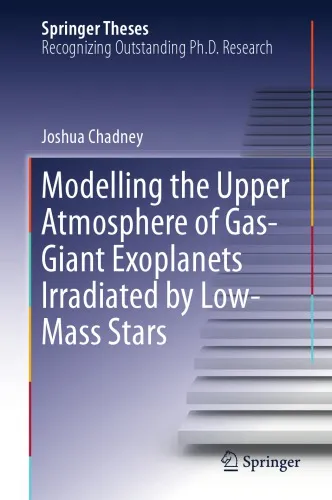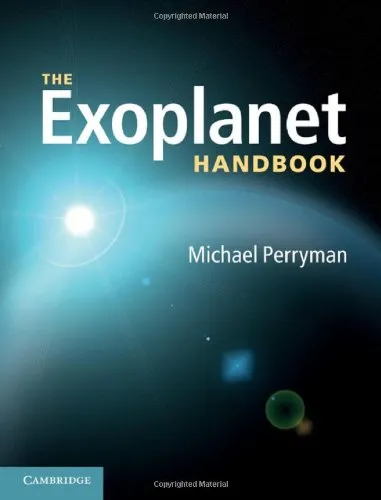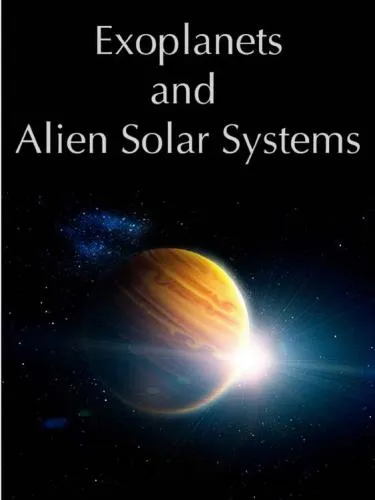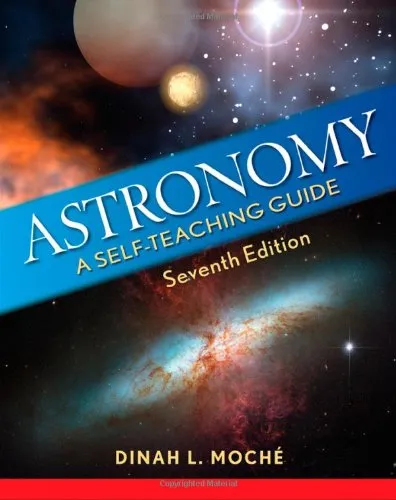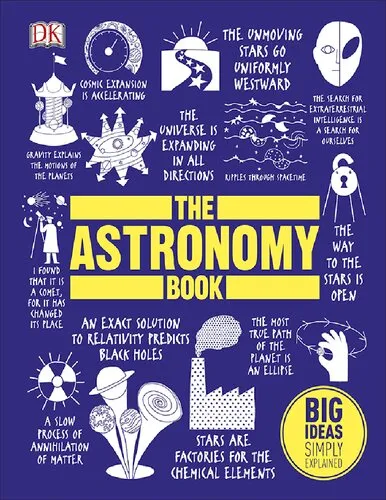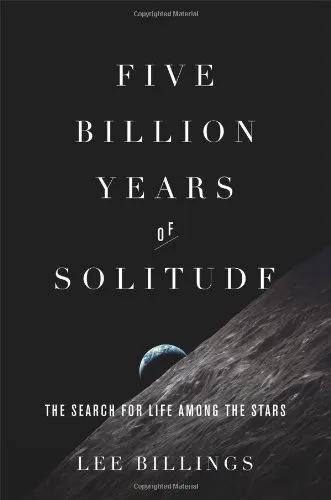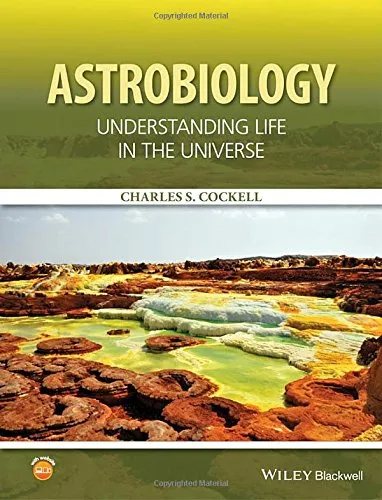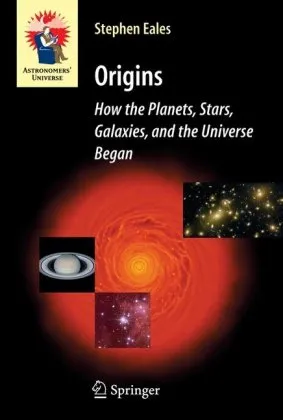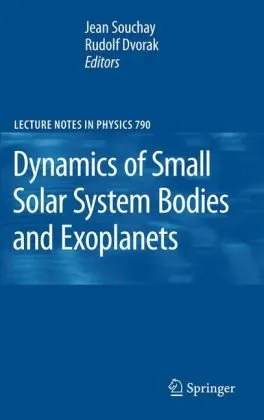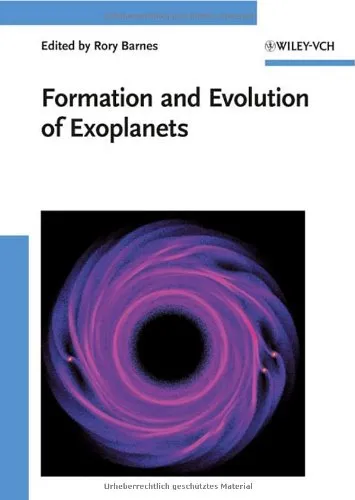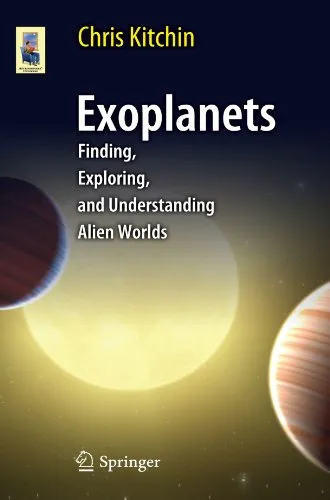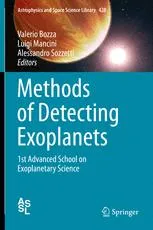Modelling the Upper Atmosphere of Gas-Giant Exoplanets Irradiated by Low-Mass Stars
4.0
بر اساس نظر کاربران

شما میتونید سوالاتتون در باره کتاب رو از هوش مصنوعیش بعد از ورود بپرسید
هر دانلود یا پرسش از هوش مصنوعی 2 امتیاز لازم دارد، برای بدست آوردن امتیاز رایگان، به صفحه ی راهنمای امتیازات سر بزنید و یک سری کار ارزشمند انجام بدینکتاب های مرتبط:
معرفی کامل کتاب "Modelling the Upper Atmosphere of Gas-Giant Exoplanets Irradiated by Low-Mass Stars"
کتاب "Modelling the Upper Atmosphere of Gas-Giant Exoplanets Irradiated by Low-Mass Stars" اثری علمی و تخصصی در زمینه فیزیک و نجوم است که بر روی مدلسازی اتمسفر بالایی سیارات گازی غولپیکر در برخورد با تابش ستارههای کمجرم تمرکز دارد. این کتاب برای محققان، دانشجویان و علاقهمندان به نجوم و اخترفیزیک اطلاعات ارزشمندی درباره طبیعت و رفتار سیارات فراخورشیدی ارائه میکند.
خلاصهای از محتوا
این کتاب عمیقاً به بررسی تاثیرات تابشهای شدید ستارههای کمجرم بر لایههای بالایی جو سیارات فراخورشیدی میپردازد. نویسنده از تکنیکهای پیشرفته computational physics و تحلیل دادهها برای مدلسازی و پیشبینی رفتار اتمسفر این سیارات بهره گرفته است. بررسی دقیق تعاملات پیچیده بین تابشهای UV و X-ray با اتمسفر بالایی، از جمله تبخیر جو، فرار حرارتی و شیمی پیچیده مرتبط با آنها در این اثر گنجانده شده است.
موضوعات کلیدی عبارتند از: تأثیر تابشهای پرانرژی ستارههای کمجرم بر سیارات گازی، چگونگی اندازهگیری و شبیهسازی فرآیندهای فیزیکی در اتمسفر، اهمیت ویژگیهای ترکیبی سیارات در مدلسازی و آینده مطالعه سیارات فراخورشیدی. نویسنده همچنین جنبههای بینرشتهای مدلسازی، شامل شیمی اتمسفری، فیزیک پلاسما، و انتقال انرژی را به طور جامع و دقیق تحلیل کرده است.
نکات کلیدی کتاب
- تحلیل نقش تابشهای high-energy در تخریب اتمسفر سیارات فراخورشیدی.
- توسعه مدلهای پیشرفته برای شبیهسازی فرار حرارتی از جو سیارات گازی.
- مطالعه تعاملات بین ستارههای کمجرم و سیارات گازی غولپیکر برای پیشبینی شرایط زیستپذیری.
- پژوهش گسترده در حوزه تابشهای ستارهای و تأثیر آنها بر شیمی اتمسفر.
نقلقولهای مشهور از کتاب
"The interaction between stellar radiation and planetary atmospheres unlocks fundamental insights into the evolution and diversity of exoplanets."
"Understanding atmospheric escape is crucial for painting a more accurate picture of planetary habitability."
چرا این کتاب اهمیت دارد؟
این کتاب نه تنها برای جامعه علمی و پژوهشگران در حوزه اخترفیزیک و علوم سیارهای ارزشمند است، بلکه برای هر علاقهمند به جستجوی اسرار جهان ناشناخته نیز الهامبخش خواهد بود. با رشد روزافزون کشف سیارات فراخورشیدی طی دو دهه گذشته، مطالعه درباره دینامیک و شیمی جو این سیارات ضروریتر از همیشه شده است. کار Chadney در این کتاب به پژوهشگران ابزارها و دیدگاههای جدیدی ارائه میدهد تا بتوانند جهانهای بیگانه را با دقت بیشتری مدلسازی کنند.
علاوه بر این، رویکرد جامع و بینرشتهای کتاب میتواند پایهای برای پژوهشهای آینده در مورد سیارات فراخورشیدی و زیستپذیری آنها ایجاد کند. خواننده با مطالعه این اثر، درک عمیقی از اهمیت تابش ستارهای و تأثیر آن بر تاریخچه تکاملی سیارات بهدست میآورد.
با توجه به پیچیدگی این موضوع، کتاب به گونهای طراحی شده که خوانندگان متخصص بتوانند نهایت استفاده را از آن ببرند، در حالی که برای خوانندگانی که تازه وارد این حوزه شدهاند نیز شروعی مناسب به شمار میآید.
Introduction to 'Modelling the Upper Atmosphere of Gas-Giant Exoplanets Irradiated by Low-Mass Stars'
In the rapidly evolving field of exoplanetary science, understanding the upper atmospheres of gas-giant exoplanets represents a critical frontier. These immense planets—many located in close proximity to their host stars—hold key insights into planetary evolution, atmospheric composition, and the delicate balance of cosmic forces exerted by low-mass stars. In this book, 'Modelling the Upper Atmosphere of Gas-Giant Exoplanets Irradiated by Low-Mass Stars,' I explore the fascinating dynamics governing these celestial bodies, using robust models and data to unravel how stellar irradiation influences their upper atmospheric layers.
Designed for both researchers and enthusiasts, this work bridges the gap between theoretical modeling and observational astronomy. By focusing on gas giants orbiting low-mass stars, such as M-dwarfs, this book unveils how stellar irradiation shapes atmospheric escape, chemical processes, and thermal structures. These insights are vital not only for those studying exoplanet systems but also for advancing our understanding of habitability and the broader dynamics of planetary systems throughout the galaxy.
Detailed Summary of the Book
The book begins with an overview of current exoplanetary research, highlighting the unique environments created by the interaction of gas giants with low-mass stars. It then delves into theoretical frameworks and methodologies used to model the upper atmospheres of these planets, emphasizing the role of extreme ultraviolet (EUV) and X-ray radiation emitted by host stars. These forms of high-energy radiation significantly affect the upper atmosphere by driving thermal escape and altering the chemical composition of these planets beyond what is observed in systems with Sun-like stars.
The core chapters are structured around the development and application of sophisticated models for simulating these complex interactions. Key topics include atmospheric escape mechanisms such as hydrodynamic escape or Jeans escape, temperature and density profiles of the thermosphere and exosphere, and ionization processes within exoplanetary atmospheres. Attention is also given to observational techniques, particularly how transit observations, spectrographs, and stellar monitoring inform and refine theoretical models.
The book concludes by exploring how these findings apply to a broader range of exoplanets, drawing parallels with terrestrial-like planets and super-Earths. It posits that understanding the upper atmospheres of gas giants serves as a necessary stepping stone toward deciphering planetary habitability and detecting biosignatures in the atmospheres of smaller, rocky planets orbiting in the habitable zones of low-mass stars.
Key Takeaways
- ◾ Gas-giant exoplanets orbiting low-mass stars are subjected to intense EUV and X-ray radiation, leading to enhanced atmospheric escape processes.
- ◾ The interaction between stellar radiation and planetary atmospheres can lead to the long-term evolution and even erosion of planetary atmospheres.
- ◾ Numerical models play a pivotal role in predicting atmospheric structures, chemical compositions, and thermal behaviors under extreme stellar conditions.
- ◾ Observations from spacecraft and telescopes, combined with robust theoretical models, are essential to understanding the physics of these distant worlds.
- ◾ The lessons learned from gas-giant exoplanets can inform studies on smaller, potentially habitable planets within similar systems.
Famous Quotes from the Book
"The interplay between high-energy radiation from low-mass stars and the upper atmospheres of gas giants is not merely a cosmic coincidence; it is a forge where planetary systems are sculpted into their intricate and diverse forms."
"Each gas giant orbiting a low-mass star holds a cosmic message, written in its atmospheric layers, that tells the story of its creation, transformation, and eventual fate."
Why This Book Matters
Exoplanetary science has entered a golden age, with thousands of planets discovered orbiting stars beyond our solar system. Among these, gas giants in close orbits around low-mass stars, such as red dwarfs, present some of the most intriguing puzzles. These systems challenge our understanding of planetary atmosphere retention, atmospheric stripping by stellar winds, and the long-term viability of planetary systems in harsh stellar environments.
This book matters because it provides a detailed, accessible pathway to understanding these phenomena using the latest theoretical models and observational techniques. By focusing on the interactions between gas giants and low-mass stars, the book contributes to a deeper appreciation of the diversity of planets in our galaxy. Furthermore, the insights offered here have implications for planetary habitability, the search for life beyond our solar system, and the refinement of techniques in exoplanet atmospheric characterization.
For students, researchers, and anyone captivated by the mysteries of the cosmos, 'Modelling the Upper Atmosphere of Gas-Giant Exoplanets Irradiated by Low-Mass Stars' delivers both a rigorous scientific foundation and a compelling exploration of what lies beyond our solar system.
دانلود رایگان مستقیم
شما میتونید سوالاتتون در باره کتاب رو از هوش مصنوعیش بعد از ورود بپرسید
دسترسی به کتابها از طریق پلتفرمهای قانونی و کتابخانههای عمومی نه تنها از حقوق نویسندگان و ناشران حمایت میکند، بلکه به پایداری فرهنگ کتابخوانی نیز کمک میرساند. پیش از دانلود، لحظهای به بررسی این گزینهها فکر کنید.
این کتاب رو در پلتفرم های دیگه ببینید
WorldCat به شما کمک میکنه تا کتاب ها رو در کتابخانه های سراسر دنیا پیدا کنید
امتیازها، نظرات تخصصی و صحبت ها درباره کتاب را در Goodreads ببینید
کتابهای کمیاب یا دست دوم را در AbeBooks پیدا کنید و بخرید
